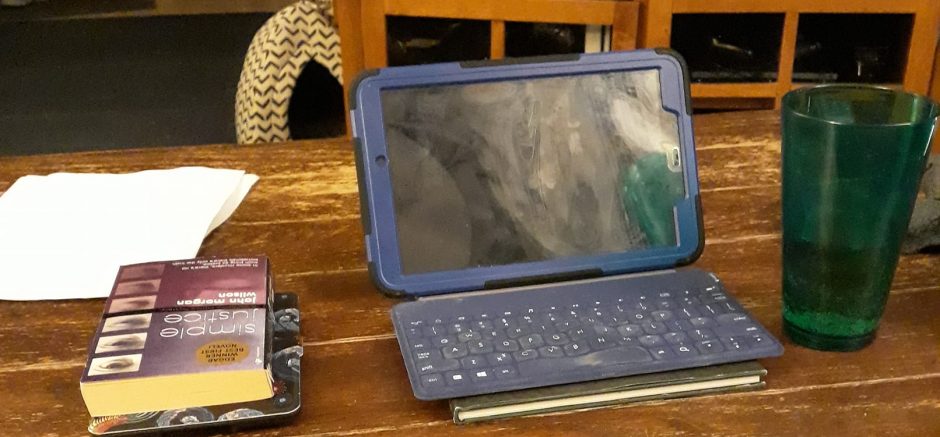*
Remember for me the day your mother made you quit school.
February 1902. I help her pluck two chickens and yet I want to clean away her crime. Wipe the red rain from the snow where the hens struggled to keep running, their heads axed behind them. They are still frightened in death. I breathe the cut odor of quill and feather, the severed wings. I shiver. Too cold for work dress and apron. “The pinfeathers,” mother says, “you’re missing some.” Today is a school day and I won’t be going. I’ll never be a scholar who eats whole paragraphs from the primer. I’ll not ride the cover’s black horse bearing Demeter and Persephone to the winter underworld, hooves pounding frozen ground, cleaving it. Hardest-working student, I practiced my penmanship. Two long tables, a board before me where I wrote with a stick sharpened, then charred. I’ll miss the roll call Emily. Like a girl lying on her back in pasture grass, lazily stirring the clouds. In the one-room where eight grades are taught by one nineteen-year-old girl, her lessons were my ribbon candy, satin curls with silver stripes. “Pinfeathers, Emily,” mother reminds. Tiny soft fleece to warm the eggs I pinch from the broken body.
*
What was it like to covet a brother’s college studies?
It is to be mesmerized, to climb stairs in summer when no one bothers the books, to enter his room and kneel by the desk and reach for them. Heat breathing from the trees, heat in the fields where workhorses stand five feet high, each weighing a ton. Gentle gray giants plodding through the south acre dumb to sentences. Ignorant to turns of phrase. Dust from the dirt road rises as a wagon passes by, dust falls on the ditch lilies. In my hands the heft of a book, the heaviness of the cover, how forbidden, how different from the wooden spoon, the knife, the scrub board, the rag, the hoe, the harness, the blue grist stone. The scent of its pages. Latin, Catullus, Passer, deliciae meae puellae, to touch the words, to taste them in my mouth. Another volume. Geography. Maps. Burma. Siam. Countries in pale tangerine colors. French West Africa. The Volta River. Gold Coast. My eyes leave the coast on the fine line like the delicate leg of a daddy-long-legs. I am on an in-land voyage of saffron ink. “Go fetch the clothes from the line.” Mother’s voice comes for me.
*
Tell me what a rumor of smallpox was?
We drink from the same dipper. The Moses children sit around the school’s potbelly stove. Wilma. Francesca. Magdalena. Fern. And the boys Mathias, Arnold. Wilbur. They smell like wet feathers; gut muskiness. Like clothes gone without washing. I give them my bread, bacon cracklings smeared over the large cuts of rye. They cough, blow their noses on rags, then knot them under their sleeves. Fern is my favorite. Delicate as a grasshopper’s leap. When Fern falls sick, the red spots appear. My mother has already taken Anna out of school. How glad my sister is soon to be married to the handsome tinner Frank. But I who love books am made to tie on the apron. I stand over the paprika-scented chicken soup, staring into bottomlessness. “Stir, Emily, just so the yellow skin won’t form. Where’s your head?” My hand pushes the spoon through the kettle’s huge round. I pretend I turn to tallow, melt away. A rumor of smallpox. Mother fears a daughter with pocked face no man will marry. A daughter blinded. My turn to make the farmhouse bread. Lips pressed, I obey, white knuckled, I make fists of beaten dough.
*
Do you remember your wedding day?
My lips full, pouty. Look at me stand in sepia in 1906. I hold four long-stemmed white roses. Smoldering beauty, I had to tame. Gold Coast, Africa—my heart’s desire—yet I chose the farm boy who made me wife. Rings given and taken, then a buggy ride to Kadgihn Studio. My boy-husband eyes the picture taker, I gaze into the faraway. My black hair’s kink refuses its pins. The afternoon cookstove-hot, I follow the binder that four workhorses drag through ripened oats. My husband thrusts his pitchfork. I learn the truth of twine, cut and tie, chaff and straw, the bundles shat and separated. In the yellow air the visions mingle. Gold-painted faces. Men seven feet tall in loincloths. The jaguar’s maw. Who remembers vows? Work is how we lived. Married in the morning and in the afternoon our honeymoon, we tramped the fields. Then in the darkness of our wedding bed more dirty sweat.
 Stephanie Dickinson was raised on an Iowa farm and now lives in New York City where she struggles for the legal tender . Her novel Half Girl (winner of the Hackney Award given by Birmingham-Southern) is published by Spuyten Duyvil. Corn Goddess (poems), Road of Five Churches (stories) and Straight Up and No Sky There (stories) are available from Rain Mountain Press. Her story “A Lynching in Stereoscope” was reprinted in Best American Nonrequired Reading and “Dalloway and Lucky Seven” and “Love City” in New Stories from the South, Best of 2008 and 2009. She is the winner of New Delta Review’s 2011 Matt Clark Fiction prize judged by Susan Straight. Her website is www.stephaniedickinson.net. A new novella, Lust Series, is out from Spuyten Duyvil. It is violent, gothic, rural, and both feminine and feminist.
Stephanie Dickinson was raised on an Iowa farm and now lives in New York City where she struggles for the legal tender . Her novel Half Girl (winner of the Hackney Award given by Birmingham-Southern) is published by Spuyten Duyvil. Corn Goddess (poems), Road of Five Churches (stories) and Straight Up and No Sky There (stories) are available from Rain Mountain Press. Her story “A Lynching in Stereoscope” was reprinted in Best American Nonrequired Reading and “Dalloway and Lucky Seven” and “Love City” in New Stories from the South, Best of 2008 and 2009. She is the winner of New Delta Review’s 2011 Matt Clark Fiction prize judged by Susan Straight. Her website is www.stephaniedickinson.net. A new novella, Lust Series, is out from Spuyten Duyvil. It is violent, gothic, rural, and both feminine and feminist.






Wow! Instant fan of your work! Thank you.